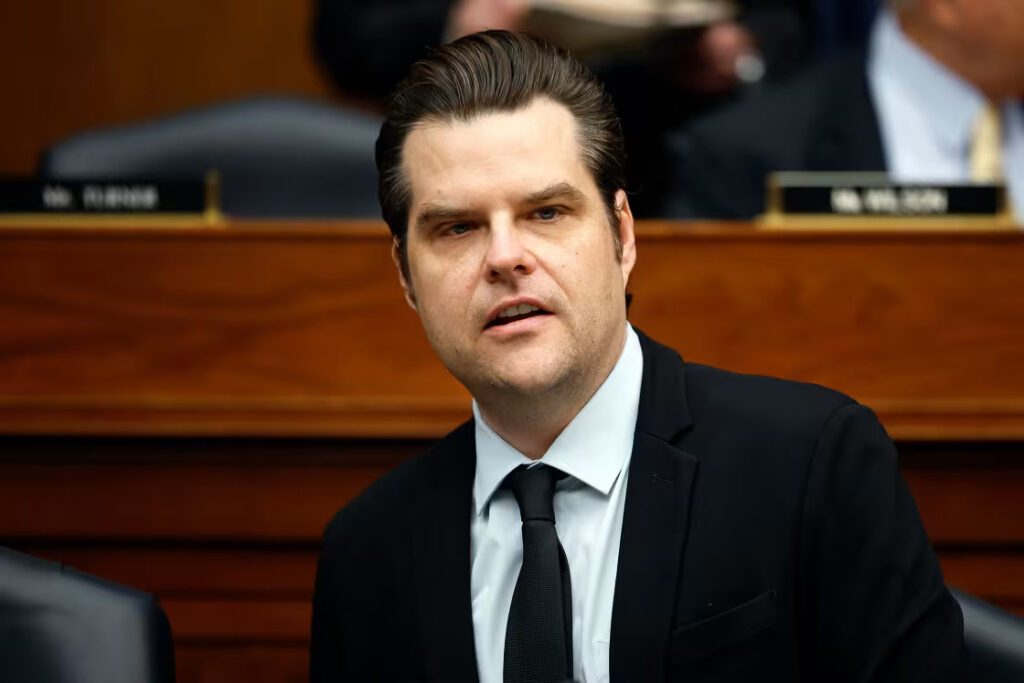In a contentious vote on Thursday, the U.S. House of Representatives rejected an effort to release a long-awaited Ethics Committee report on former Rep. Matt Gaetz, R-Fla., a prominent ally of former President Donald Trump. The decision followed a heated debate over the report, which details allegations of drug use, sexual misconduct, and obstruction of a House investigation involving the former congressman.

The vote, initiated by Democrats, resulted in the matter being sent back to the bipartisan Ethics Committee. With this move, the possibility of the report becoming public remains uncertain.
The Ethics Committee report stems from a years-long investigation into claims against Gaetz, including allegations of illicit drug use, sexual misconduct involving a 17-year-old, and obstruction of the committee’s probe. The report also scrutinized his behavior during his tenure in Congress.
The bipartisan Ethics Committee convened privately for the second time in recent months to deliberate on whether the report should be made public. After over two hours of discussion, the committee issued a statement saying it is “continuing to discuss the matter.”
Rep. Michael Guest, R-Miss., the committee chairman, emphasized that no final decision had been made but assured reporters that the committee would reconvene before the end of the year. The committee’s top Democrat, Rep. Susan Wild, D-Pa., did not attend Thursday’s meeting, and her office declined to comment.

Democratic Representatives Sean Casten of Illinois and Steve Cohen of Tennessee forced Thursday’s votes, introducing resolutions aimed at compelling the committee to release the Gaetz report and preserve its findings for the public.
The Casten resolution sought the direct release of the Ethics Committee’s report, while Cohen’s resolution focused on preserving and making public the records related to the investigation. As both resolutions were introduced as “privileged,” they required action within two legislative days.
However, Republicans blocked the resolutions by voting to refer them back to the Ethics Committee. The Casten resolution was referred to the committee in a 206-198 vote, with only one Republican, Rep. Tom McClintock of California, siding with Democrats. The Cohen resolution met a similar fate, being referred to the committee by a vote of 204-198.
Democrats have intensified their efforts to release the report, particularly as Gaetz has hinted at a potential gubernatorial bid in Florida for 2026 or other roles in a future Trump administration. Democratic lawmakers argue that withholding the report undermines the Ethics Committee’s credibility and Congress’s integrity.

Rep. Casten highlighted historical precedents to challenge Republican claims that the committee lacks jurisdiction over former lawmakers. For example, in 1987, the Ethics Committee released a report on former Rep. Bill Boner, D-Tenn., after he resigned. Similarly, in 2006, the committee published its findings on Rep. Mark Foley, R-Fla., after he stepped down amid allegations of sending explicit messages to a teenage congressional page.
“Given the serious nature of the allegations against Representative Gaetz,” Casten’s resolution stated, “failure to release the report undermines the committee’s credibility and the integrity of the House.”
Republicans pushed back, arguing that the Ethics Committee’s jurisdiction ends when a member resigns. They further emphasized that publishing the report would set a problematic precedent.
Rep. Michael Guest previously argued that Gaetz’s resignation and withdrawal from consideration for a potential Trump cabinet role “should end the discussion” about the report. Republicans used a similar argument to reject a Democratic resolution in 1996 that sought to release an Ethics Committee report on then-Speaker Newt Gingrich, R-Ga.
Gaetz, who resigned from Congress in November after being nominated by Trump to serve as attorney general, continues to deny all allegations. He withdrew his name from consideration for the position shortly after his resignation.
With speculation about Gaetz’s political future growing, Democrats fear the suppressed report may allow him to reemerge unscathed in a high-profile role.



